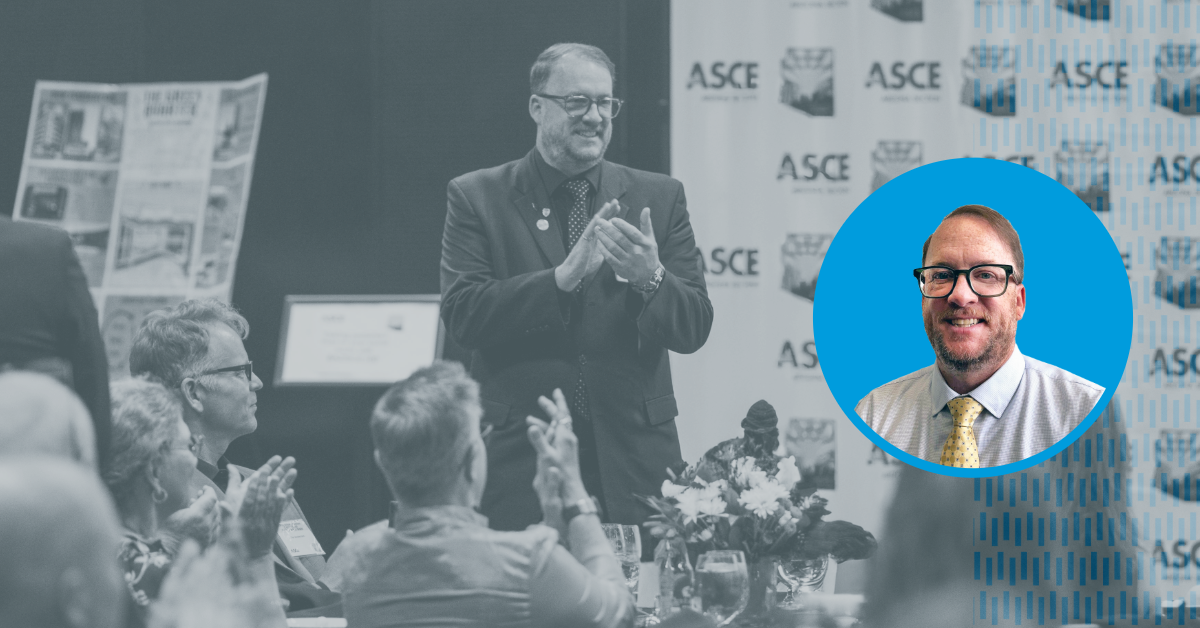
Why Engaging Beyond Project Work Builds Better Engineers
Throughout my career, I’ve noticed that meaningful growth often happens beyond daily project work. Professional organizations create space for conversations that challenge assumptions, introduce new ways of thinking, and open doors to collaborations that would not have happened otherwise. These experiences build skills and relationships that do not always develop within project teams alone.
Being named a Fellow of the American Society of Civil Engineers (ASCE) this year prompted me to reflect on the role these organizations have played in my development and the value they continue to offer our profession. This article outlines why involvement matters and how it can evolve over the course of a career, beginning with early awareness and continuing into leadership.
Why Industry Involvement Matters
Industry organizations range from broad multidisciplinary groups like ASCE to specialized groups like the Water Environment Federation (WEF)—two examples that I participate in personally. Involvement can take many forms: simply holding a membership, receiving publications, attending conferences, volunteering on social or technical committees, taking on a leadership role, and participating in the active advancement of the organization. Each offers an opportunity to build knowledge and influence the profession in meaningful ways.
The Role of Professional Organizations
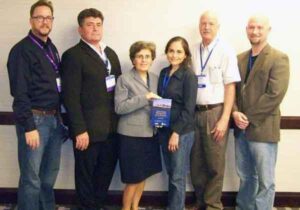
ASCE/EWRI Desalination and Water Reuse Committee, 2013 World Environmental & Water Resources Congress
Professional organizations connect people across regions and disciplines, shaping conversations that determine how the industry responds to emerging challenges. With groups focused on specialties across the full project lifecycle, there are opportunities for professionals in a wide range of roles to get involved. These platforms also provide space to contribute to technical guidance, shape policy conversations, and collaborate on challenges that no single agency or firm can solve alone.
One organization that has been especially formative in my path is the American Society of Civil Engineers. Early in my career, ASCE introduced me to real-time discussions about standards and best practices, often led by peers managing the same project pressures I was learning to navigate. Committee work exposed me to emerging technologies, policy shifts, and research priorities well before they reached the field.
Over time, I’ve had the chance to contribute to initiatives at the local, regional, and national level. For example, I helped develop national-level technical guidelines and manuals of practice, including the WEF Wastewater Treatment Fundamentals III: Advanced Treatment publication and the Arizona 2020 and 2025 Report Card for America’s Infrastructure. Collaborating on efforts like these gave me the chance to work alongside peers across the country and contribute to tools that support the profession at scale.
Personal Growth Through Involvement
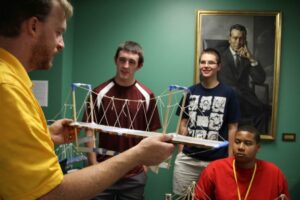
Engineering outreach at Arizona State University summer camp.
We all find different ways to “fill our cup”—to recharge our motivation and stay connected to why the work matters. Professional organizations play an important role in that process. They create space to step outside of project deadlines, explore diverse types of work, and connect with peers who share a commitment to growth. Because this work carries real responsibility, staying connected to the professional community can be a powerful way to stay energized, supported, and focused on the bigger picture.
I first got involved through my student chapter of ASCE, where I served as an outreach chair. Organizing and volunteering for K-12 outreach events taught me how to communicate engineering concepts clearly and learn from others’ insights. Later, I served as the team captain in the Student Steel Bridge Competition, where I practiced collaborating under pressure and leading our team to achieve feats none of us could have accomplished alone. Those early relationships and experiences built a foundation that led to my first job and has continued to open doors throughout my career.
Professional organizations are also highly focused on supporting people and leadership initiatives. Through participation in organizations, I have found mentors I would not have met in a workplace setting alone. I also learned how to be a mentee—how to ask questions, follow through, and stay open to feedback—all skills that were invaluable when I later became a mentor myself. Many of the most impactful relationships I’ve had in this field, including the one that led me to Consor, began through professional networks outside of my day job.
Benefits to Professionals and the Industry
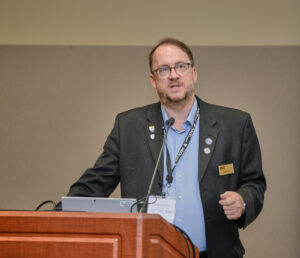
Moderating at the 2025 Arizona ASCE/ASHE Statewide Annual Conference.
When professionals contribute their time and knowledge, they help sustain a profession that depends on shared insight and collective progress. Mentorship, collaboration, and involvement in technical work are ways experienced engineers give back, but they also serve to refine practice, surface opportunities to improve, and carry lessons forward. The result is a profession that can respond to uncertainty more effectively and deliver infrastructure that communities can depend on.
Involvement in these organizations can alter the trajectory of a career. Speaking at a local conference early on helped me develop confidence that later carried into client workshops and presentations at national events. Serving on technical committees exposed me to regulatory trends, which allowed me to prepare project teams for changes before they reached the job site. These experiences helped build trust with peers and future collaborators who later became project partners.
That kind of participation benefits more than just one career. When professionals contribute their time and knowledge, they strengthen the standards that engineers across the industry rely on. I’ve seen how ideas surfaced in committee meetings can change design approaches or improve coordination across agencies. The result is a profession better equipped to deliver infrastructure that communities can rely on for generations.
How to Engage Across a Career
For every professional, your level of engagement in organizations will naturally change as your career progresses. At some points, participation might look like attending events or following industry updates, while at others you may have the capacity and expertise to take on leadership roles. Your evolution may be driven by personal goals, available time, and opportunities that resonate most with you.
The following framework outlines ways to engage meaningfully at different stages.
Early Awareness and Exploration (0–2 years)
This stage is about gaining exposure, building curiosity, and beginning to understand how professional organizations complement project work. Involvement might include:
- Participating in communities of practice at your firm or joining a professional organization as an entry-level member.
- Attending local meetings or webinars to observe discussions and meet peers.
- Reading industry publications to stay informed on emerging developments.
The value of this stage lies in helping individuals build foundational awareness and a sense of belonging within the profession, while also introducing fresh energy and perspectives into industry conversations. For just getting started, internal communities of practice can offer a familiar entry point. Participating in discussions and knowledge-sharing within your firm can build the confidence and communication skills that translate well to external organizations. When I joined ASCE as a student, simply attending meetings and reading their materials gave me early insight into water resource issues I hadn’t yet encountered in my coursework.
Active Participation and Growth (2+ years)
This stage is about contributing to discussions, building credibility, and aligning your interests with opportunities to participate more actively. Involvement might include:
- Volunteering for committees that focus on technical areas or community initiatives.
- Presenting at conferences to share lessons from project work.
- Building relationships with peers beyond one’s immediate workplace.
Participation at this level helps professionals grow leadership and communication skills, gain early exposure to regulatory trends, and contribute insights. Serving on my first technical committee gave me a front-row seat to policy changes that later shaped project planning and helped build trust with peers who later became project partners.
Leadership and Influence (8+ years)
This stage is about shaping the profession through experience, mentorship, and strategic guidance. Involvement might include:
- Chairing committees, leading conference tracks, or serving as an officer at local, regional, or national levels.
- Mentoring emerging professionals and connecting them with opportunities to get involved.
- Representing the profession in policy discussions, technical standards development, or multi-organization initiatives.
At this level of influence, professionals help sustain and evolve the field, making changes that meaningfully impact the communities we serve. Contributing to national initiatives like ASCE’s Infrastructure Report Cards and WEF publications has been one way I’ve worked alongside others to advance best practices and elevate the profession as a whole.
What Industry Involvement Has Taught Me About Growth
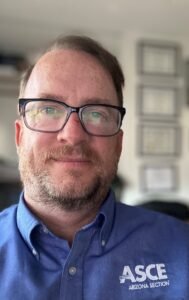
Earning Fellow status at ASCE prompted me to reflect on how involvement in professional organizations has shaped my career. Reaching this milestone deepens my sense of responsibility to help others access similar opportunities and contribute to efforts that strengthen our field.
From attending meetings as a student to leading committees at the local and national level, each stage brought opportunities for personal and professional growth. Just as importantly, each stage introduced me to people—peers, mentors, and collaborators—who helped me grow into the engineer I am today. I’m especially grateful for those who have paved the way before me, whose work continues to shape a more sustainable, equitable, and inclusive industry focused on protecting public and environmental health. To the colleagues and mentors who offered guidance and challenged me to keep growing: thank you.
If you’re considering how to get started or take the next step in your own involvement, know that every contribution matters. New members bring energy and curiosity, mid-career professionals contribute active project experience, and senior leaders offer guidance and long-range vision. Multidisciplinary organizations like ASCE, the National Society of Professional Engineers, and the American Council of Engineering Companies—along with specialized organizations like Society of Women Engineers, Water Environmental Federation, or ITE—A Community of Transportation Professionals—may align with your interests. Begin with one step that fits your stage and capacity, whether it’s attending a meeting or volunteering for a committee. Over time, those steps can grow into meaningful contributions that support both your career and the future of civil engineering.
